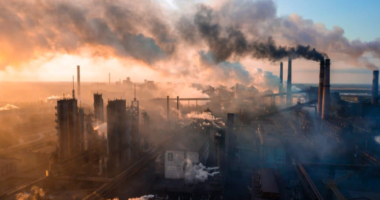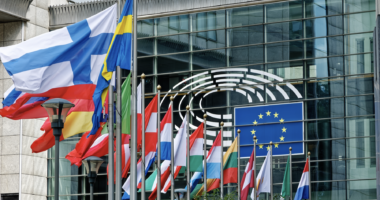Climate, Health and Equity Brief
Climate action takes center stage across federal agencies
July 22, 2024

The Climate, Health & Equity Brief is GMMB’s take on the latest news on the current impacts of climate change. If you haven’t subscribed yet, you can do so by clicking here.
Hot Topic: Federal action. Agencies across the Biden Administration have initiated a wide range of ambitious climate-related actions in recent weeks, demonstrating what can be accomplished when the federal government is led by those who trust and act on climate science.
First, OSHA has proposed a new rule to protect workers from extreme heat—the first major U.S. regulation of its kind—which, if finalized, will protect 36 million U.S. workers from harm related to heat exposure on the job. The rule states that at 80 degrees, employers must offer drinking water and rest breaks as needed for outdoor and at-risk indoor workers, such as those who work in kitchens and warehouses. At 90 degrees, workers must get 15-minute breaks every two hours. Penalties for heat-related violations in workplaces would also increase significantly.
Next, FEMA will now consider climate change risks when rebuilding after natural disasters. The agency has expanded floodplain standards to account for future climate risks such as sea-level rise, rather than relying on historical data alone. This policy shift—which President Obama initiated in 2012 and the Trump administration scrapped in 2016—requires that homes, schools, hospitals, and critical infrastructure are built or rebuilt to higher elevation standards, saving lives and taxpayer dollars.
Third, the Department of Energy announced it will grant auto factories $1.7 billion to support the conversion of 11 shuttered or at-risk auto manufacturing and assembly facilities to produce electric vehicles and other clean energy technology, a move that will support roughly 18,000 jobs. DOE officials noted that priority was given to factories in communities that suffered disproportionately from pollution or lack of investment.
Fourth, the Department of Agriculture announced it will grant $375 million to fund renewable energy projects in rural areas. The largest share of funding will go to Alaska, Arizona, Kentucky and Nebraska for battery storage systems, substation improvements, hydroelectric plants and community solar facilities.
Finally, the National Highway Traffic Safety Administration (NHTSA) announced fines of $146 million for General Motors because nearly 6 million of its 2012-2018 vehicles do not comply with emissions and fuel economy standards. The penalty comes after the EPA found that GM pickup trucks and SUVs emit over 10% more carbon dioxide on average than GM’s initial compliance testing claimed.
The continued focus on increasing America’s climate resilience by the Biden administration stands in sharp contrast to the tenets of Project 2025—the alarming conservative blueprint for a second Trump term—which seeks to eliminate climate regulations, place political personnel in positions to oversee science, reduce agency limitations on polluting industries, dismantle NOAA, and eliminate climate-focused offices within the Energy Department, further underscoring the monumental nature of the 2024 election.
Human Health
The devastating heat wave that gripped much of the United States this month killed or contributed to the deaths of hundreds of people in California, Oregon, and Arizona, with more fatalities expected as extreme temperatures continue over the summer months. (Los Angeles Times, The Lund Report, NBC News)
After wreaking havoc in several Caribbean countries, Hurricane Beryl knocked out power for 2.2 million Houston residents, leaving hundreds of thousands without power for several days in 100ºF temperatures and some facing a growing hunger crisis amid relentless heat and humidity. (The Atlantic, The Guardian, Grist)
Planetary Health
A new report finds that extreme wildfires have doubled in frequency and magnitude in the past 20 years and nearly 20,000 wildfires have burned more than two million acres across the United States so far this year. (CBS News)
A new study found that melting of the Greenland and Antarctic ice sheets is making Earth fatter and slowing its rotation by several milliseconds, which has the potential to disrupt internet traffic, financial transactions and GPS navigation, all of which rely on precise timekeeping. (BBC)
Driven by unseasonably high sea-surface temperatures, Hurricane Beryl broke two records this month, reaching Category 4 a week earlier in the season than any previously observed storm and becoming fastest-strengthening storm ever recorded before September. (BBC, The Washington Post)
According to a new report, the risk of hurricane-induced power outages could become 50% higher in some parts of the U.S. in the coming decades, with the risk 70% higher in Boston, Houston and New Orleans and 119% higher in Miami. (The New York Times)
Scientists report that sea level rise may have wiped out an entire species in the U.S. for the first time, with the loss of the only known stand of Key Largo tree cactus providing a potential indicator of what is to come for other plants and animals in similarly vulnerable environments. (Axios)
Equity
People with disabilities face particular climate challenges, including the compromise of essential medications and equipment during power outages and reliance upon evacuation plans that neglect mobility issues, underscoring the need for inclusive disaster planning and resources. (Mother Jones)
Rural drivers, who lack public transit and drive many more miles on average than those in non-rural households, are increasingly switching to EVs to save thousands of dollars a year despite having significantly less access to public chargers. (Yale Climate Connections)
Action
President Biden’s OSHA has proposed a new rule to protect workers from extreme heat—the first major U.S. regulation of its kind—aimed at protecting 36 million delivery drivers, kitchen staff, landscapers, and farm, factory, construction, and warehouse workers from harm related to heat exposure on the job. (AP News)
Driven by a President Biden executive order, FEMA will now consider climate change when it rebuilds after floods, requiring that homes, schools, hospitals, and critical infrastructure be built or rebuilt to higher elevation standards, a move that aims to save lives and taxpayer dollars. (Grist)
President Biden, DHS Secretary Mayorkas, and FEMA Administrator Criswell announced the 656 projects that will receive $1 billion in climate resilience funding through the Building Resilient Infrastructure and Communities program, which aims to help U.S. communities prepare for and mitigate the impacts of natural disasters. (Homeland Security Today)
The National Highway Traffic Safety Administration issued GM nearly $146 million in penalties after determining that 5.9 million trucks and SUVs from 2012-2018 emitted over 10% more carbon dioxide on average than GM’s testing claimed and failed to comply with federal fuel economy requirements. (AP News)
The Biden Administration announced it will grant $1.7 billion from the Inflation Reduction Act for car and auto parts factories to manufacture electric vehicles and clean energy technologies. (The New York Times)
The U.S. Department of Agriculture announced $375 million in grants for rural energy projects across the country, including renewable electrification, battery storage projects, community solar, and improving energy efficiency. (The Hill)
A federal judge advanced an Oregon county’s lawsuit that holds fossil fuel companies accountable for public health costs resulting from the state’s historic June 2021 heat dome, which killed 69 people—one of the first such lawsuits in the U.S. focused on public health costs of heat during a specific occurrence of the “heat dome effect.” (Inside Climate News)
Politics & Economy
Project 2025, a sobering conservative blueprint for a second Trump term, seeks to eliminate climate regulations, place political personnel in positions to oversee science, reduce agency limitations on polluting industries, dismantle NOAA, and eliminate climate-focused offices within the Energy Department, further intensifying alarm about a potential second Trump term. (The Hill)
NATO’s 2024 Climate Change and Security Impact Assessment cites 29 military deployments in response to climate-related emergencies in 2023 alone, warns that extreme heat is challenging weapons systems and threatening troops’ health, and reaching climate tipping points could rapidly escalate instability and displacement in regions already experiencing climate stress. (Axios)
Once a clean energy advocate, Donald Trump’s selected running mate, Sen. J.D. Vance (R-OH), has become a vocal climate denier and supporter of fossil fuels, earning him significant financial backing from the oil and gas industry and helping fuel his selection as Trump’s running mate. (POLITICO)
A new report found that 123 members of the US. House and Senate deny the scientific consensus that climate change is occurring as a result of human activity, and those members have collectively received $52,071,133 in lifetime campaign contributions from the fossil fuel industry. (The Hill)
Cities, regulators, and companies are calling attention to the fact that increasingly powerful and frequent heat waves cause tens of billions of dollars in damages annually but aren’t covered by insurance policies, which traditionally only cover sudden and accidental damages from storms but not the gradual changes imposed by extreme heat. (The Wall Street Journal)
A $21 billion liquefied natural gas plant under construction in Louisiana’s rapidly sinking Plaquemines Parish exemplifies the Gulf Coast’s challenge of expanding fossil fuel infrastructure while facing accelerating climate risks, including sea level rise and intensifying storms that threaten both the facility and nearby communities. (The Washington Post)
Life as We Know It
Climate change is rapidly and dramatically reshaping some of the most iconic vacation destinations in the U.S., especially along the coasts where rising sea levels make tourist hot spots harder to reach and more dangerous to enjoy. (USA Today)
Ahead of the 2024 Paris Olympics, Olympians and other elite athletes, climate scientists and thermal physiologists have published a report analyzing the notable increase in heat threats expected at this year’s Games. (Climate Matters)
Tourists in Copenhagen who participate in the city’s climate initiatives—including cycling, using public transit and participating in clean-up efforts—will now be rewarded with free meals, kayak rentals, access to museum tours, and other perks to encourage more eco-friendly tourism. (The New York Times)
Kicker
Seeking answers to your burning climate questions? Test-drive The Washington Post’s new AI-driven chatbot to get answers, with responses pulled from existing Washington Post articles.
The facts of global warming demand our urgent attention, especially in Washington. Good stewardship, prudence, and simple commonsense demand that we act to meet the challenge, and act quickly.”
– Late Sen. John McCain (R-AZ)
The GMMB Climate, Health & Equity Brief would not be possible without the contributions of the larger GMMB team—Aaron Benavides, Stefana Hendronetto, Nikki Melamed, Sharde Olabanji and Marci Welford. Feedback on the Brief is welcome and encouraged and should be sent to [email protected].





